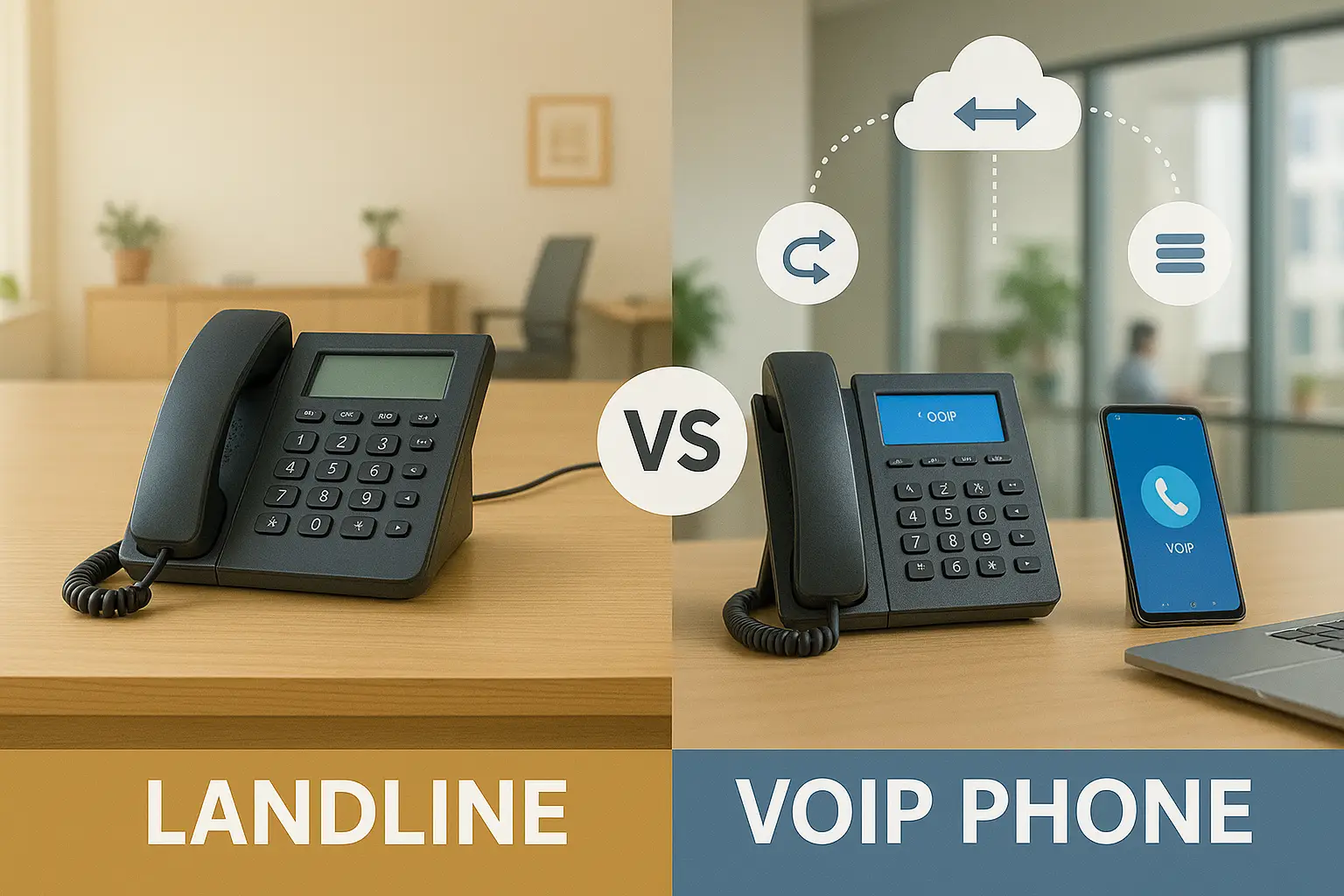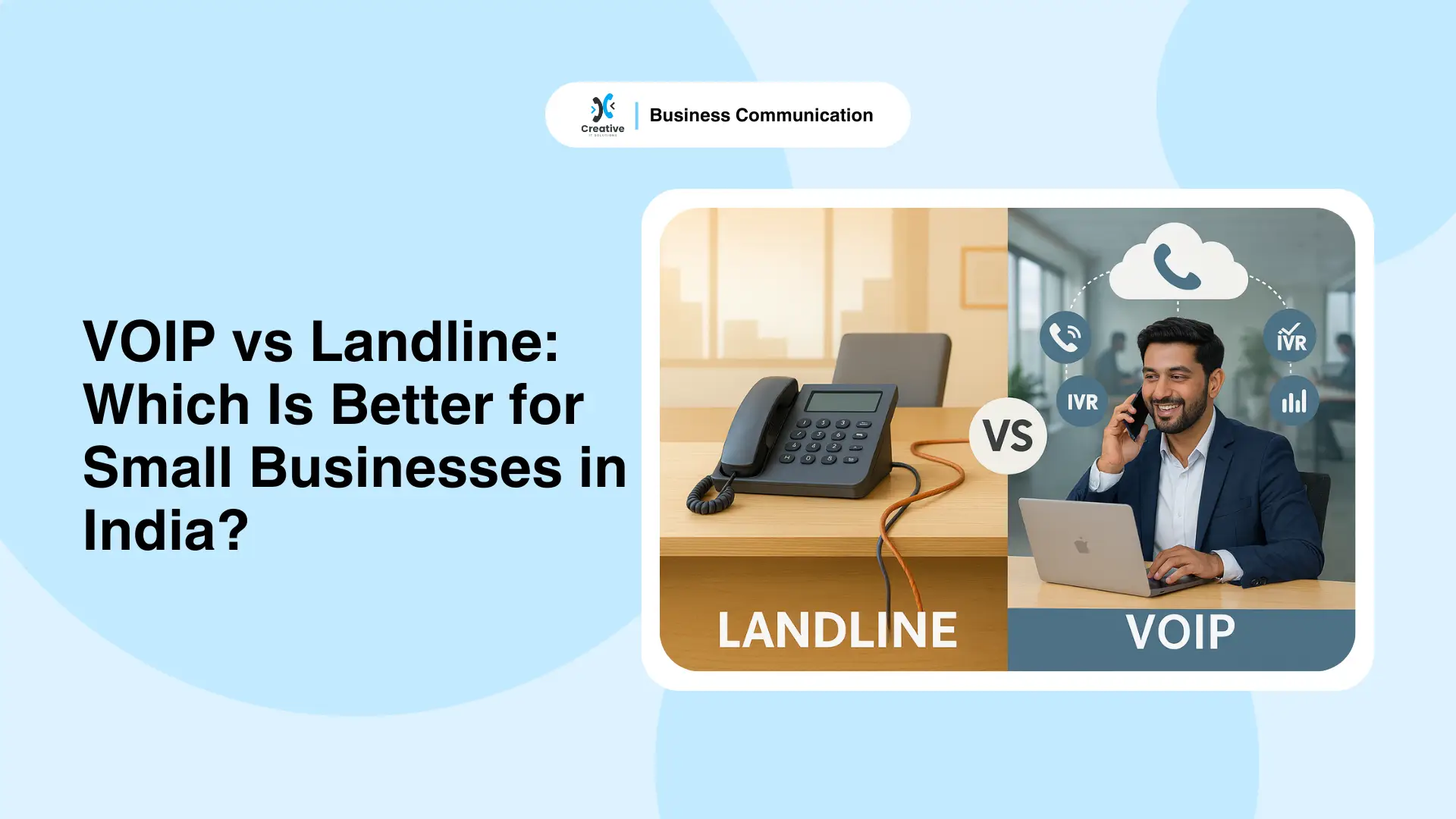Small businesses in India often ask the same question: Which is better – VOIP vs Landline? For decades, traditional landline phones have been the backbone of business communication. They are familiar, stable, and simple to use. But times are changing. Modern VOIP systems are quickly replacing landlines because they are cheaper, more flexible, and packed with features that help companies scale.
Unlike landlines, which tie you to a single desk or location, VOIP allows calls to happen anywhere there’s internet – on laptops, smartphones, or IP phones. This flexibility is especially important for startups, SMEs, and hybrid teams that need to stay connected beyond the office.
In this guide, we’ll compare VOIP vs Landline for business, highlight the real pros and cons, and explain which option makes the most sense for small businesses in India today.
Table of Content
ToggleVOIP vs Landline for Business – An Overview
When comparing VOIP vs Landline for business, the core difference lies in how the two systems work.
- VOIP (Voice over Internet Protocol): VOIP uses the internet to make and receive calls. Your voice is converted into digital packets and sent over your broadband connection. This makes VOIP highly flexible, cost-effective, and loaded with advanced features like IVR menus, call recording, analytics, and CRM integration.
- Landline Phones: A landline depends on copper wires or fixed connections to transmit calls. While they are stable and do not require internet, they offer very limited features and tie businesses to one location.
Why This Matters for Indian Businesses
For small businesses in India, the choice between VOIP vs Landline often comes down to three things:
- Cost: Landlines charge higher rates for long-distance and international calls, while VOIP drastically reduces these costs.
- Flexibility: Landlines keep you tied to the office desk. VOIP allows you to take calls on laptops, mobile apps, or IP phones anywhere you have internet access.
- Features: VOIP comes with smart cloud-based features, while landlines only handle voice calls.
In short, VOIP is designed for modern businesses that want scalability and mobility, while landlines are reliable but limited in scope.
VOIP vs Landline Pros and Cons
When comparing VOIP vs Landline pros and cons, small businesses in India need to look beyond cost. The choice affects flexibility, customer experience, and how well your communication system supports growth. Let’s break it down:
Pros of VOIP
- Lower Cost for Local and International Calls
VOIP drastically reduces call charges, especially for intercity or overseas clients. For example, an IT company in Delhi calling clients in the US can save thousands of rupees each month compared to landline billing. - Advanced Features Like IVR, Call Recording, and Analytics
Unlike landlines, VOIP isn’t just about making calls. You get professional features such as IVR menus (“Press 1 for Sales”), call recording for training, and analytics dashboards to measure call performance. - Works on Multiple Devices
With VOIP, your team can use laptops, smartphones, or VOIP desk phones to answer calls. This is perfect for remote or hybrid teams that need to stay connected outside the office. - Easy to Scale as Your Team Grows
Adding a new line in VOIP is as simple as requesting your provider to activate it. No need to install new wires or buy expensive hardware.
Cons of VOIP
- Needs a Stable Internet Connection
Since VOIP depends on the internet, poor connectivity can disrupt calls. Businesses in areas with weak broadband may struggle. - Call Quality Can Drop if Bandwidth Is Poor
Without proper QoS (Quality of Service) settings, VOIP calls may suffer from lag, echo, or jitter when the internet is overloaded with downloads or video streaming.
Pros of Landline
- Reliable Even With Power or Internet Issues
Landlines continue to work during power cuts or internet downtime, which can be useful in areas with unstable infrastructure. - Simple to Set Up With No Complex Configuration
Landlines are plug-and-play. Small businesses with no IT staff often find them easier to install and use compared to setting up VOIP systems.
Cons of Landline
- Expensive for Long-Distance Calls
Calling outside your city or country on a landline is costly, making it unsustainable for businesses that handle interstate or international communication. - No Modern Features Like IVR or CRM Integration
Landlines are limited to basic calling. They don’t support features like call forwarding, analytics, or CRM integration, which are essential for professional business communication. - Not Scalable for Remote or Hybrid Teams
Landlines tie employees to one physical desk. In today’s remote-friendly environment, they limit flexibility and collaboration.
Related Post: Can a VOIP Phone Be Used as a Regular Phone?

VOIP Phone vs Landline – Which Works Better?
A VOIP phone vs Landline comparison highlights how business communication has evolved. At first glance, VOIP desk phones look almost identical to traditional landline phones, but the way they work is very different.
- VOIP Phones: These devices connect through the internet rather than copper wires. A VOIP number can be used across multiple devices – laptops, smartphones, or desk phones – giving businesses the flexibility to take calls from anywhere. For example, a startup in Bangalore can answer the same VOIP number at the office desk, on a manager’s smartphone, or on a laptop while traveling.
- Landline Phones: A landline locks you to one physical location. The number is tied to the fixed line, meaning you must be at your desk to receive or make calls. This limits flexibility, especially for remote workers or sales teams who are often on the move.
Why This Matters for Businesses
For small businesses in India, flexibility is key. A VOIP phone lets you keep one professional number while staying reachable across devices. Landlines may offer consistent sound quality, but they restrict mobility and scalability.
In short, when comparing VOIP phone vs Landline, VOIP offers more freedom, making it the better choice for modern businesses that need mobility and multi-device access.
VOIP vs Landline Sound Quality
For many small businesses, sound quality is the deciding factor in the VOIP vs Landline debate. After all, no matter how affordable or feature-rich a system is, it must deliver crystal-clear conversations with customers.
- VOIP Sound Quality: VOIP call quality depends largely on internet speed and network stability. With a strong broadband connection and proper VOIP QoS (Quality of Service) settings, VOIP calls can sound as clear as landlines – sometimes even better. Modern VOIP providers also use codecs and noise-reduction features that ensure professional-grade audio. For example, a support team in Delhi can maintain smooth customer conversations even during heavy office internet usage if QoS is configured correctly.
- Landline Sound Quality: Traditional landlines are known for consistent audio because they run on dedicated copper lines, unaffected by internet traffic. However, this reliability comes with limitations. Landlines don’t support advanced features like call recording, IVR, or mobile app integration. They keep you tied to one place, which reduces their practicality in today’s remote and hybrid work culture.
Bottom Line on Sound Quality
When comparing VOIP vs Landline sound quality, landlines may still feel more stable in areas with weak internet. But for most urban businesses in India with strong broadband, VOIP offers equal – if not better – audio quality, plus the flexibility and features landlines can’t provide.
VOIP vs Landline for Small Business in India
For startups and SMEs, the VOIP vs Landline for small business decision usually depends on two factors: budget and growth plans. While landlines still serve as a basic option, VOIP offers far more value for businesses that want to scale and stay competitive.
Why VOIP Works Better for Small Businesses
- Scale Quickly Without New Hardware
VOIP grows with your business. If you hire new staff, you can add lines instantly without installing cables or buying expensive PBX systems. - Add Toll-Free or International Numbers Instantly
Expanding into new markets? VOIP providers let you activate toll-free or international numbers in minutes. For example, an SME in Mumbai can get a US number to serve global clients without setting up an overseas office. - Support Remote Teams Across India
With VOIP, your team can answer calls from laptops, smartphones, or VOIP phones anywhere there’s internet. This flexibility is ideal for India’s growing hybrid and remote work culture.
When Landlines Still Make Sense
Landlines may still be useful for very small shops, rural businesses, or areas with weak broadband connectivity. They don’t depend on the internet, which makes them more reliable in locations where stable internet is still a challenge.
The Smarter Investment for SMEs
For most SMEs in India, VOIP is the smarter investment. It delivers lower costs, modern features, and flexibility that landlines simply cannot match. By choosing VOIP, small businesses future-proof their communication and stay ready for growth.
VOIP vs Landline – The Final Decision for Indian Businesses
So, VOIP vs Landline – which is better? The answer depends on your business needs, but for most startups, SMEs, and call-heavy industries in India, VOIP is the clear winner.
- VOIP Benefits: It lowers costs, scales quickly, and brings advanced features like IVR, call recording, analytics, and CRM integration. For growing businesses, VOIP adapts as your team expands, making it a future-ready investment.
- Landline Benefits: Landlines still offer reliability in areas with poor internet or frequent outages. They are simple to set up, but they remain limited in functionality.
Why VOIP Wins for Modern Businesses
In today’s competitive market, communication isn’t just about making calls – it’s about providing great customer service, managing remote teams, and scaling affordably. VOIP delivers on all these points, while landlines fall short.
For small businesses in India, VOIP helps you:
- Save money on local and international calls
- Add new lines or toll-free numbers instantly
- Support remote and hybrid teams
- Build a more professional image with cloud telephony features
Want to compare VOIP vs landline business phones?
Explore our Cloud Telephony services at Creative IT Solutions and discover how scalable VOIP call center solutions can help small and growing businesses communicate better.
Frequently Asked Questions
Q1. What is the disadvantage of using VOIP?
The main disadvantage of VOIP is that it depends on internet speed. Poor connectivity can affect call quality, unlike landlines that work independently of broadband.
Q2. Is VOIP reliable for business use?
Yes, VOIP is reliable for business when set up correctly with QoS (Quality of Service) and a stable internet connection. Many SMEs in India already use VOIP for daily communication.
Q3. What will happen to landlines in 2027?
Globally, traditional landlines are being phased out and replaced with digital or VOIP systems. In India, businesses are slowly moving from fixed landlines to VOIP vs Landline business phones for better features and lower costs.
Q4. How much does VOIP cost per month?
VOIP costs in India vary by provider and plan. Small businesses can expect to pay between ₹500 to ₹1,500 per month per line, depending on features like IVR, call recording, or toll-free numbers.
Q5. Is landline better than VOIP for small businesses?
Landlines are simple and reliable but lack flexibility. VOIP is usually better for small businesses because it offers lower call rates, scalability, and advanced features like CRM integration.
Q6. Can I keep my existing number if I switch to VOIP?
Yes, most providers allow number portability. You can move your landline number to VOIP and continue using it on smartphones, laptops, or IP desk phones.
Q7. Does VOIP offer better sound quality than landlines?
With a strong internet connection, VOIP sound quality can match or even surpass landlines. QoS settings ensure smooth conversations without lag or echo.

